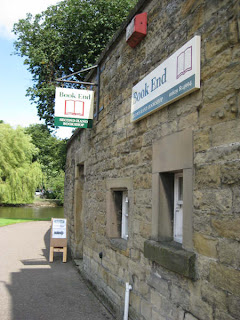
Where? Aberdeen, Scotland, UK
Recommended by Amy Orr
Amy said: "I wanted to let you know about a fantastic bookstore in Aberdeen that I think deserves some recognition... I am just a big fan of it having shopped there many times before. It is called 'Books and Beans', and is just off Union Street in Aberdeen, UK. It has a huge collection of fiction and non-fiction, far more than you ever see displayed (they have databases for searching what they have in their stock room, retrievable at any time). My particular favourite part of this bookshop is the sci-fi section, which is excellent and far bigger than you'd expect from a normal, non sci-fi orientated bookstore."
This addition to our Guide from Aberdeen in Scotland is a rather hip secondhand bookstore slash café, located in the very center of the city. Books and Beans kicked off in 2003 and, with the help of their excellent service and unique setting, has gained quite a reputation among the locals and tourists alike. It is also the fist independent fair trade café in the city (besides their flavorful coffees and hot drinks, the menu also offers hot homemade soups, salads, sandwiches and various baked goodies).
The ground floor of Books and Beans is occupied by beans i.e. the café itself, while the books are stocked upstairs. To make your bookbrowsing experience more pleasurable, the upper floor is furnished with cozy armchairs, where you can take your coffee with you. Furthermore, the bookstore/café is equipped with 6 personal computers with internet access.
And the stock? Well, we're certain that Books and Beans will not leave you feeling aloof: 15 000 titles selected on the basis of quality of the book and popularity of the author, yet also selected to suit everyone's taste. They are praised for having a collection of books on anything from comics through fiction to law. Their database is searchable, so you can find any title you are interested in immediately. Or you can simply take your time and browse for your pleasure.
Also important to note is the fact that Books and Beans holds readings (seems that poetry readings by Aberdeen's Dead Good Poet's Society are quite popular with their visitors) on a regular basis. Oh, if you thought that's it, you're wrong: the bookstore is also child-friendly - with high chairs, crayons, various games, a children's section of books and even a children's menu in the café. Seems like they've thought of everything.
 Books and Beans
Books and Beans
Address:
22 Belmont Street
Aberdeen AB10 1JH

Website: http://www.booksandbeans.co.uk/
Phone and Email:
01224 646 438
sales@booksandbeans.co.uk
Working Hours:
Mon-Sat 9:30-16:30
Sun 10:30-15:45
This addition to our Guide from Aberdeen in Scotland is a rather hip secondhand bookstore slash café, located in the very center of the city. Books and Beans kicked off in 2003 and, with the help of their excellent service and unique setting, has gained quite a reputation among the locals and tourists alike. It is also the fist independent fair trade café in the city (besides their flavorful coffees and hot drinks, the menu also offers hot homemade soups, salads, sandwiches and various baked goodies).
The ground floor of Books and Beans is occupied by beans i.e. the café itself, while the books are stocked upstairs. To make your bookbrowsing experience more pleasurable, the upper floor is furnished with cozy armchairs, where you can take your coffee with you. Furthermore, the bookstore/café is equipped with 6 personal computers with internet access.
And the stock? Well, we're certain that Books and Beans will not leave you feeling aloof: 15 000 titles selected on the basis of quality of the book and popularity of the author, yet also selected to suit everyone's taste. They are praised for having a collection of books on anything from comics through fiction to law. Their database is searchable, so you can find any title you are interested in immediately. Or you can simply take your time and browse for your pleasure.
Also important to note is the fact that Books and Beans holds readings (seems that poetry readings by Aberdeen's Dead Good Poet's Society are quite popular with their visitors) on a regular basis. Oh, if you thought that's it, you're wrong: the bookstore is also child-friendly - with high chairs, crayons, various games, a children's section of books and even a children's menu in the café. Seems like they've thought of everything.
 Books and Beans
Books and BeansAddress:
22 Belmont Street
Aberdeen AB10 1JH

Website: http://www.booksandbeans.co.uk/
Phone and Email:
01224 646 438
sales@booksandbeans.co.uk
Working Hours:
Mon-Sat 9:30-16:30
Sun 10:30-15:45
View Books and Beans in a larger map














